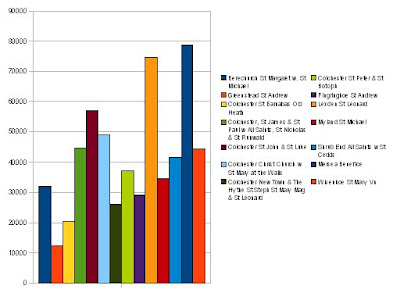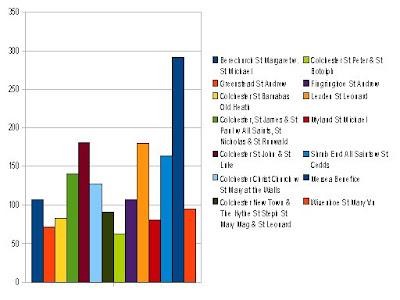bls has launched a C.H.O.C.T.A.W. manifesto, for the avoidance of crap worship. This is something I have a lot of sympathy with – and yet I am presently being accused of precisely that because I am encouraging – nay, I am insisting – on the use of the guitar in our principal communion service. Click ‘full post’ for a preview of an article in our upcoming parish magazine which explains why. See also this post (via *Christopher) for another point of view, and the comments there for yet more!
There are few things that are more likely to cause disagreement amongst Christians than questions to do with the use of music in worship. Consider this cartoon – as the saying goes – music is too important to be left to the musicians (grin). However, putting on a more serious hat, I would like to say something about the use of the guitar for some songs in the 11am communion service, as this has been causing pain to some members of the congregation. This may take a little time as it touches on very central elements of the faith.
It may be argued that it is never appropriate to use a guitar in the context of a church worship service. This I see as a very weak argument, for a rapid survey of church history will demonstrate that stringed instruments have a much deeper and stronger relationship with Jewish and Christian worship than has, for example, the organ. There are enough Scriptural references for people to be familiar with (try the last few psalms for a starting place) but consider this passage:
“It happened on Sunday after Christmas – the last Sunday they played in Longpuddle church gallery, as it turned out, thought they didn’t know it then. As you may know, sir, the players formed a very good band – almost as good as the Mellstock parish players that were led by the Dewys, and that’s saying a great deal. There was Nicholas Puddingcome, the leader, with the first fiddle; there was Timothy Thomas, the bass-viol man; John Biles, the tenor fiddler; Dan’l Hornhead, with the serpent; Robert Dowdle, with the clarionet; and Mr Nicks, with the oboe – all sound and powerful musicians, and strong-winded men – they that blowed. For that reason they were very much in demand Christmas week for little reels and dancing parties; for they could turn a jig or a hornpipe out of hand as well as ever they could turn out a psalm, and perhaps better, not to speak irreverent. In short, one half-hour they could be playing a Christmas carol in the squire’s hall to the ladies and gentlemen, and drinking tay and coffee with ’em as modest as saints; and the next, at the Tinker’s Arms, blazing away like wild horses with the ‘Dashing White Sergeant’ to nine couple of dancers or more, and swallowing rum-and-cider hot as flame.”
(From A FEW CRUSTED CHARACTERS by Thomas Hardy)
The particular form of worship used within a church changes over time – it always has done and always will. The particular style of music used here in West Mersea for the 11am was principally shaped by the Victorians, who were responsible for introducing robed choirs (imported from 17th century Italy). The question of principle is whether that style of music is necessarily the right one to adopt today, bearing in mind the purposes that music is used for. There is some unanimity on that score: some months ago the Worship Committee agreed that “the role of music is to support, enhance, enable and – occasionally – to express the worship of the congregation”. The issue is therefore whether the use of the guitar is something which enables a congregation to worship; but that itself begs the more fundamental question: what is the congregation at the 11am service?
One of the principal changes that has come about in the last few years here at St Peter’s and St Paul’s is the development of the 9:30 congregation. The liturgy at the 9:30 was specifically designed to be simpler and more accessible to the newcomer, and the music more modern. When the service was launched there was no clarity about whether it would succeed or not, or whether there would be much of a demand for it or not. Manifestly there was both a desire for such a service and it has been tremendously successful. Yet the consequence is that the overall balance of the church’s life has altered – and that has to affect the 11am service.
The 11am service is the principal Holy Communion offered in this church. It is the place where Christians who are separated through the week can gather and break bread together – as Christians have done since the very beginning. Whilst I am very happy that some of our services can be seen as ‘niche’ services, whereby those who desire particular forms of worship can have those desires met, I believe it would destroy our unity in the faith if the 11am service became a ‘niche’ service in that way. The purpose of the 11am is to be the ‘big tent’ whereby as many Christians as possible can come together for the breaking of the bread. That will inevitably mean that no one group within the church will be completely content with what is offered, whether that be “traditionalists” who dislike the guitar, “9:30ers” who don’t like choral anthems, or the Rector who mourns the absence of incense. Yet this is no bad thing – we are called to love our neighbours as ourselves and if we are only prepared to worship with those who are just like us then we have failed to recognise the Body of Christ (see 1 Corinthians 11.29 – and it has the consequences that Paul describes in that passage).
As a consequence of these two things – a change in the balance of our overall church congregation, and the necessity for the 11am service to be a spiritual home for as many brothers and sisters as we can achieve – we have begun to explore different ways of doing the 11am service, so that it more accurately reflects the nature of the whole congregation, not just the existing 11am attenders. There is no point in having a principal communion service if the nature of that service is such as to actively exclude large swathes of the church body. This is still a work-in-progress, and is tied up with the re-ordering of the sanctuary. It will take quite a few more months before we are in a position to see where the 11am service will be, although those who attended the recent ‘9:15 Morning Praise with Holy Communion’ will have a good idea of how I would like to see the 11am service develop.
There are undoubtedly times when, as we have explored a different way to do the 11am, we have tried something new and it hasn’t worked. That is my fault as I am the one pushing the exploration, sometimes over the objections of the musicians! Yet I don’t believe that God is opposed to exploration and failure – there would be nothing worth redeeming if that was the case. Whatever the birth-pains associated with the introduction of the guitar into the 11am service I do see it as absolutely essential to the long term spiritual health of the church that we embrace the guitar – and the flute and the piano and the violin – and the choir and the soloist and the organ – that, in short, we embrace each other at the 11am service. This is our common meal, where the church family says grace and shares with each other. There will always be jostling and elbow-jabs but that is what makes us who we are: a Christian community, learning what it means to love one another as our Lord loves us.


